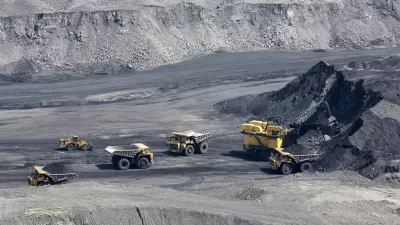No surprise here. Scott Pruitt agreed with nine state attorney generals, including his replacement in Oklahoma, to reverse a request enacted by his predecessor to require oil and gas drillers to record information on the release of methane emissions.
While the request may seem a logical step toward reducing methane emissions, the oil and gas industry viewed it as 'burdensome.' Look for more use of that term as it was repeated as an explanation as to why the fuel efficiency standards will be relaxed, expected in an upcoming announcement on Tuesday from the Trump administration.
The election of Donald Trump, and the Feb. 17 confirmation of Scott Pruitt as McCarthy's replacement, provided an opportunity for the oil industry to have the information request rescinded.
On March 1, EPA "received a letter (pdf) from nine state Attorneys General and the Governors of Mississippi and Kentucky, expressing concern with the burdens on businesses imposed by the pending requests," according to a March 2 notice (pdf) signed by Administrator Pruitt in which he cancels the prior administration's request:
The withdrawal is occurring because EPA would like to assess the need for the information that the agency was collecting through these requests, and reduce burdens on businesses while the Agency assesses such need.
Pruitt's decision to side with the state AGs was never in doubt as he enjoyed a "remarkably close relationship [with] the oil and gas industry while he served as Oklahoma’s attorney general," according to a report based on Pruitt's emails by Alleen Brown and Sharon Lerner for The Intercept. The emails, released four days after Pruitt's confirmations after a ruling by an Oklahoma County District judge, show "oil and gas industry operatives drafting and editing text Pruitt submitted to a federal agency."
On May 2, 2013, Scott Pruitt and 12 other attorneys general sent a letter to the EPA urging the agency to avoid regulating methane emissions. The emails released [Feb. 21] make clear that [Oklahoma City-based] Devon Energy had a hand in drafting the letter, which argued that voluntary industry efforts to restrict emissions were sufficient, that federal emissions estimates were inaccurate, and that regulating methane fell outside the purview of the law.
The withdrawal of the request was met with dismay by the environmental community.
"With this action, Administrator Pruitt is effectively telling oil and gas companies to go ahead and withhold vital pollution data from the American public," Mark Brownstein, vice president climate and energy at the Environmental Defense Fund, said in an interview with “This was a good faith effort on the part of the agency to collect additional information on oil and gas industry operations and the pollution that comes from them."
Without the methane emission data, it will be difficult to determine if existing regulations are working, and how to further reduce emissions. As power plants shift away from coal to burning more natural gas, methane emissions have increased relative to carbon dioxide emissions, the most prevalent greenhouse gas.
The withdrawal of the methane information request comes on top of somewhat related methane legislation that passed the House last month using the Congressional Review Act: to rescind a U.S. Department of the Interior rule that limits methane flaring on public land." However, the rescission may have run out of steam as the Senate has yet to act on H.J.Res.36.
FULL STORY: EPA halts inquiry into oil and gas industry emissions of methane, a powerful greenhouse gas

Maui's Vacation Rental Debate Turns Ugly
Verbal attacks, misinformation campaigns and fistfights plague a high-stakes debate to convert thousands of vacation rentals into long-term housing.

Planetizen Federal Action Tracker
A weekly monitor of how Trump’s orders and actions are impacting planners and planning in America.

In Urban Planning, AI Prompting Could be the New Design Thinking
Creativity has long been key to great urban design. What if we see AI as our new creative partner?

Cal Fire Chatbot Fails to Answer Basic Questions
An AI chatbot designed to provide information about wildfires can’t answer questions about evacuation orders, among other problems.

What Happens if Trump Kills Section 8?
The Trump admin aims to slash federal rental aid by nearly half and shift distribution to states. Experts warn this could spike homelessness and destabilize communities nationwide.

Sean Duffy Targets Rainbow Crosswalks in Road Safety Efforts
Despite evidence that colorful crosswalks actually improve intersection safety — and the lack of almost any crosswalks at all on the nation’s most dangerous arterial roads — U.S. Transportation Secretary Duffy is calling on states to remove them.
Urban Design for Planners 1: Software Tools
This six-course series explores essential urban design concepts using open source software and equips planners with the tools they need to participate fully in the urban design process.
Planning for Universal Design
Learn the tools for implementing Universal Design in planning regulations.
Appalachian Highlands Housing Partners
Gallatin County Department of Planning & Community Development
Heyer Gruel & Associates PA
Mpact (founded as Rail~Volution)
City of Camden Redevelopment Agency
City of Astoria
City of Portland
City of Laramie




























